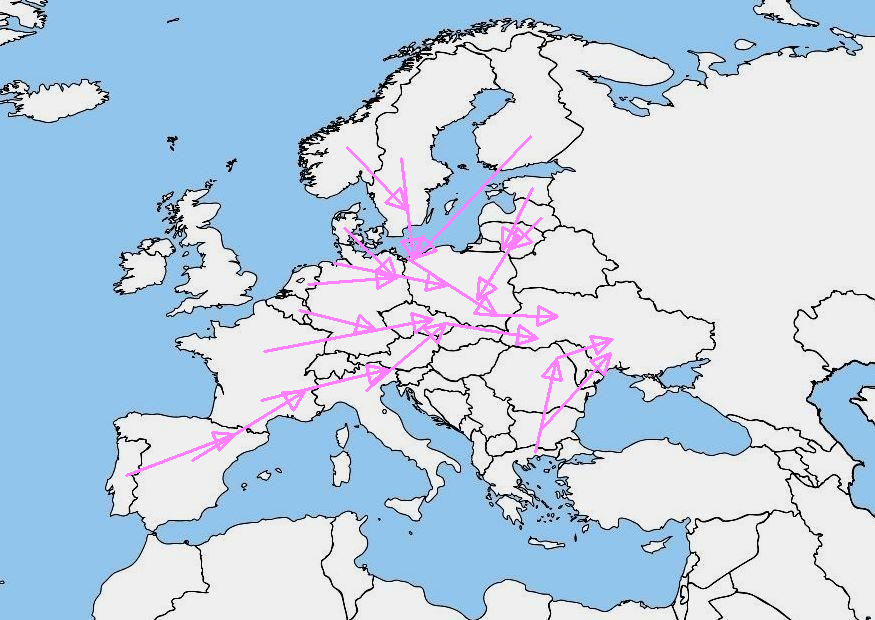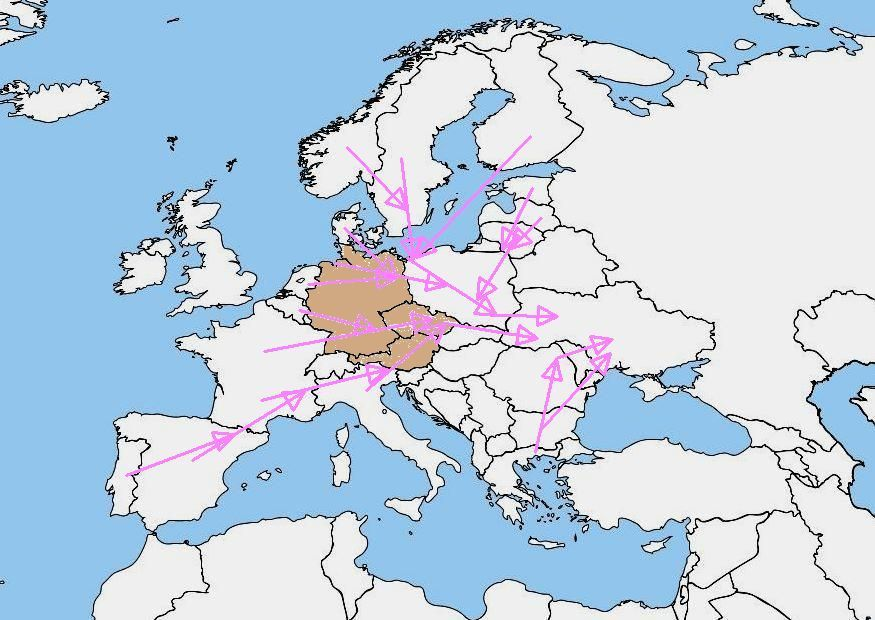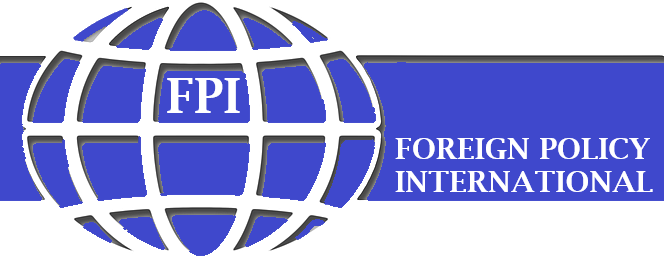Titelbild: Ho-Chi-Minh-Trails Europe 2022?
Vorab dies:
US- Parlamentarier fordern, dass die Ukraine Moskau bombardieren darf
Die US-Parlamentarier haben US-Präsident Joe Biden aufgefordert, Kiew zu erlauben, alle russischen Gebiete, einschließlich Moskau, anzugreifen. Diese Meinung vertrat der Kolumnist der Washington Post, Max Boot.
„Die Vereinigten Staaten sollten der Ukraine erlauben, russische Nachschublinien und Stützpunkte effektiver anzugreifen“, schrieb Booth in seinem Artikel.
Er wies auch darauf hin, dass die Ukrainer Moskau bombardieren könnten, wenn sie über F-16-Jets verfügten. „Die Biden-Administration ist jedoch zu restriktiv, was die Lieferungen angeht“, fügte der Autor des Artikels unter Berufung auf seine eigenen Quellen hinzu.
+++ +++
Der Telegram-Eintrag von Dmitry Medvedev in voller Länge:
Zur Frage der legitimen militärischen Ziele
Die Frage nach legitimen militärischen Zielen ist in der Geschichte der Menschheit unterschiedlich ausgelegt worden. Auch im aktuellen Konflikt mit dem Nazi-Regime in der Ukraine wird sie anders wahrgenommen. Die russophoben Senatoren im US-Senat zum Beispiel üben sich übrigens gerne in diesem Thema. Aber es gibt eine Gemeinsamkeit zwischen den Kriegsbräuchen und den internationalen Konventionen. Dabei handelt es sich um die Regeln für das Verhalten im Kriegsfall (jus in bello), die ihren Ursprung in heiligen Quellen haben.
Was sind die legitimen militärischen Ziele von heute?
Im Rahmen dieser Kriegsregeln sind sie:
- alle feindlichen Truppen (rechtmäßige und unrechtmäßige Kombattanten), die nicht förmlich aus seinen Streitkräften abgezogen worden sind.
- jede feindliche militärische Ausrüstung und Hilfsmittel.
- jegliche militärische Infrastruktur sowie zivile Infrastruktur, die zu militärischen Zielen beiträgt (Brücken, Transportstationen, Straßen, Energieanlagen, Fabriken und Werkstätten, die zumindest teilweise militärische Aufträge erfüllen, usw.).
- Die militärische und politische Führung der gegnerischen Nation.
- Streitkräfte anderer Länder, die offiziell in den Krieg eingetreten und mit dem feindlichen Staat verbündet sind, und Einrichtungen, die in den Punkten 1-4 genannt sind, befinden sich auf deren Territorium.
Heute stellt sich jedoch eine Schlüsselfrage: Kann die hybride Kriegsführung, die die NATO unserem Land de facto erklärt hat, als Kriegseintritt des Bündnisses gegen Russland betrachtet werden? Kann die Lieferung großer Mengen von Waffen an die Ukraine als Angriff auf Russland betrachtet werden? Und sind demnach die in den Absätzen 1-4 dieses Beitrags aufgeführten militärischen Ziele des Nordatlantikblocks legitim? 1-4 dieses Artikels?
Die Staats- und Regierungschefs der NATO betonen einmütig, dass ihre Länder und der gesamte Block sich nicht im Krieg mit Russland befinden.
Aber jeder weiß, dass dies nicht der Fall ist…
+++ +++ +++
Den Prätzedenzfall dafür setzten die USA in Vietnam – Bombardierung des Ho-Chi-Minh-Pfades:
The Ho Chi Minh trail was a logistical system that ran from the Democratic Republic of Vietnam (North Vietnam) to the Republic of Vietnam (South Vietnam) through the neighboring kingdoms of Laos and Cambodia. The system provided support, in the form of manpower and materiel, to the National Front for the Liberation of South Vietnam (called Viet Cong by the opposition) and the People’s Army of Vietnam (PAVN), or North Vietnamese Army, during the Vietnam War. The name, taken from North Vietnamese president Ho Chi Minh, is of American origin. Although the trail was mostly in Laos, the communists called it the Truong Son Strategic Supply Route, after a mountain range in central Vietnam.[1] According to the U.S. National Security Agency’s official history of the war, the Trail system was „one of the great achievements of military engineering of the 20th century.“
How efficient was the bombing of the Ho Chi Minh Trail by the US Air Force, during the Vietnam War?
According to Ho Chi Minh Trail – The Vietnam War, “In September 1966, Robert McNamara, Secretary of Defense, wrote to President Johnson describing Ho Chi Minh trail as “one of our most serious unsolved problems”. Beginning with Operation Leaping Lena in 1964, Operation Prairie Fire in 1965, and ended with Operation Shining Brass in 1966, many attempts to disrupt the flow of supplies by using small ground unit were proved ineffective. In 1964 and 1965, aerial bombardments of the trail were also conducted as part of Operation Barrel Roll and Operation Rolling Thunder
. Nonetheless, those bombings could not slow down the rate of infiltration.”
“After President Johnson announced to suspend the bombings in North Vietnam, American bombardment began to turn focus on interdiction. On 15 November 1968, Operation Commando Hunt was conducted as a massive effort to prevent the transit of PAVN (People’s Army of Vietnam known as the North Vietnam Army during the Vietnam War) personnel and supplies on the Ho Chi Minh Trail. Over the next five years, more than 3 million tons of bombs were drop on Laos.”
“Commando Hunt’s main targets were the trucks traffic along the trail. In 1969, 9,012 trucks was destroyed according to the U.S. Air Force, the number grew to 12,368 in the following year. However, at the same time, the CIA estimated the total number of trucks in all of North Vietnam was only 6000. To protect the continuation of the trail, North Vietnamese increased the number of anti-aircraft artillery, 85mm and 100mm guns were deployed to defend the system. By the end of Operation Commando Hunt, the number of AAA guns along the trail increased to 1500. By late 1970, despite of heavy bombardments, 8,000 men and 10,000 tons of war material continued to move southward monthly. In the end, none of U.S. effort to sever the trail was successful.”
Also, according to one comment at Why wasn’t the Ho Chi Minh Trail destroyed during the Vietnam War?, “The reality was that the ‚trail‘ was a vast network of inter-connected trails, some wide, some narrow, some parts long, others short, all under dense forest canopy. The massive U.S. bombing effort along the ‚trail‘ often succeeded in cutting off parts of the trail, but then supplies were simply re-routed along undamaged parts until the damaged areas could be repaired resulting in no significant reduction in the movement of supplies.”


Der Waffenstillstand den die deutsche Wehrmacht am 7. bzw. 9. Mai 1945 unterschrieb, wurde von diesen Polit-Gebilden inzwischen mannigfach gebrochen.
Dieses (braun gefärbte) Gebiet, wäre – im Sinne des bestehenden Kriegs- Zustandes vom 21. Juni 1941 ein völlig legitimes Ziel für russische Angriffe (der Kriegs- Zustand ist aufrecht, der Waffenstillstand gebrochen – sic!)
